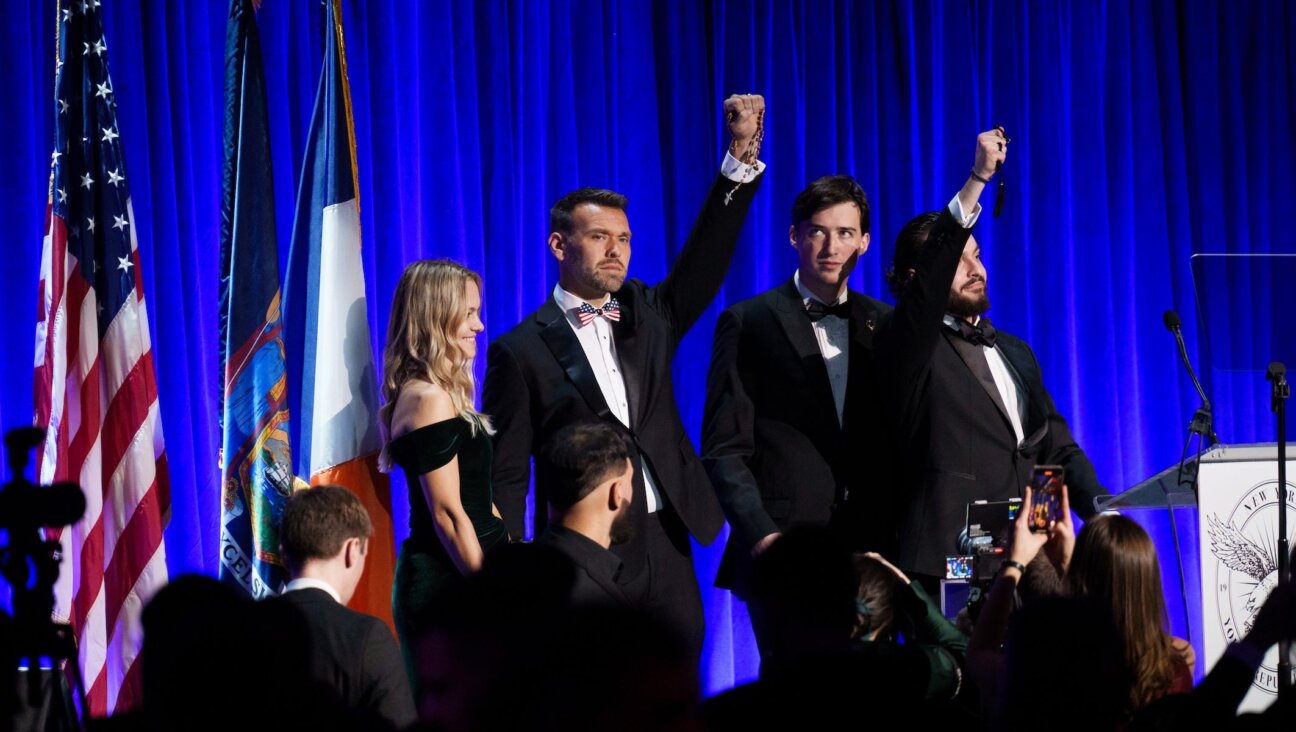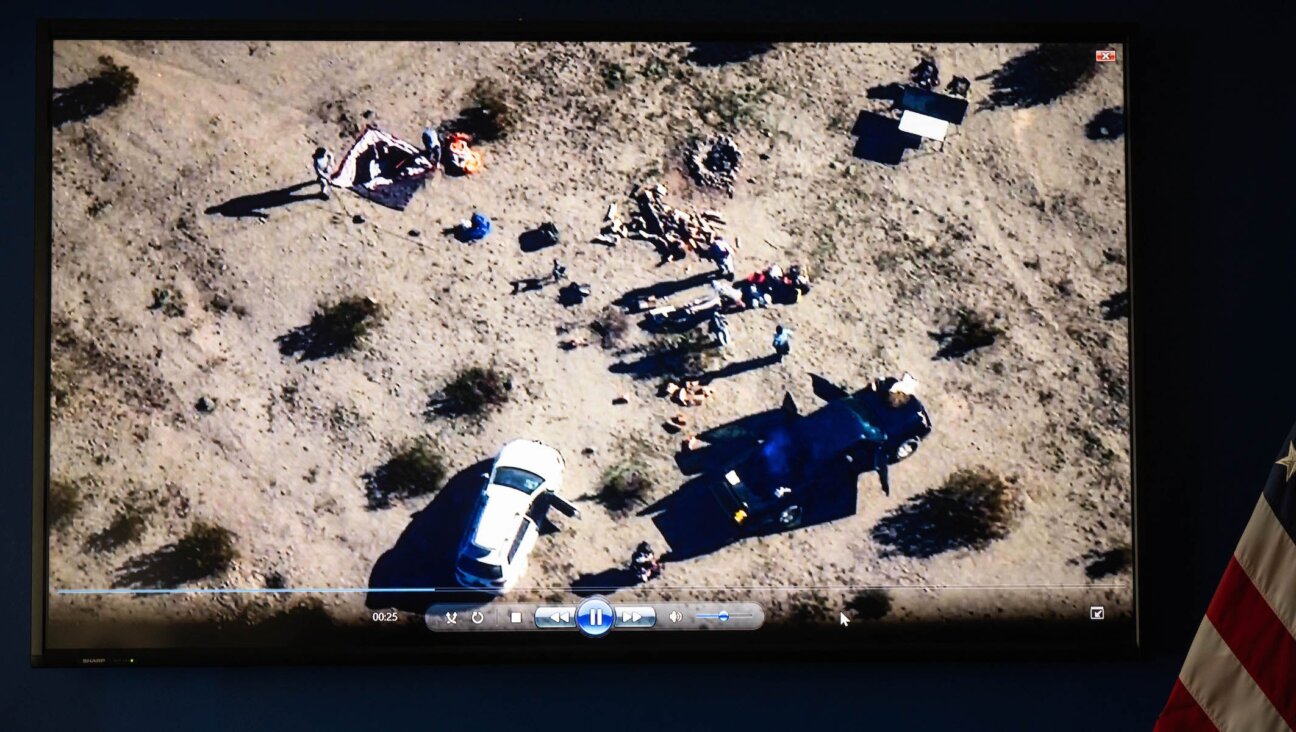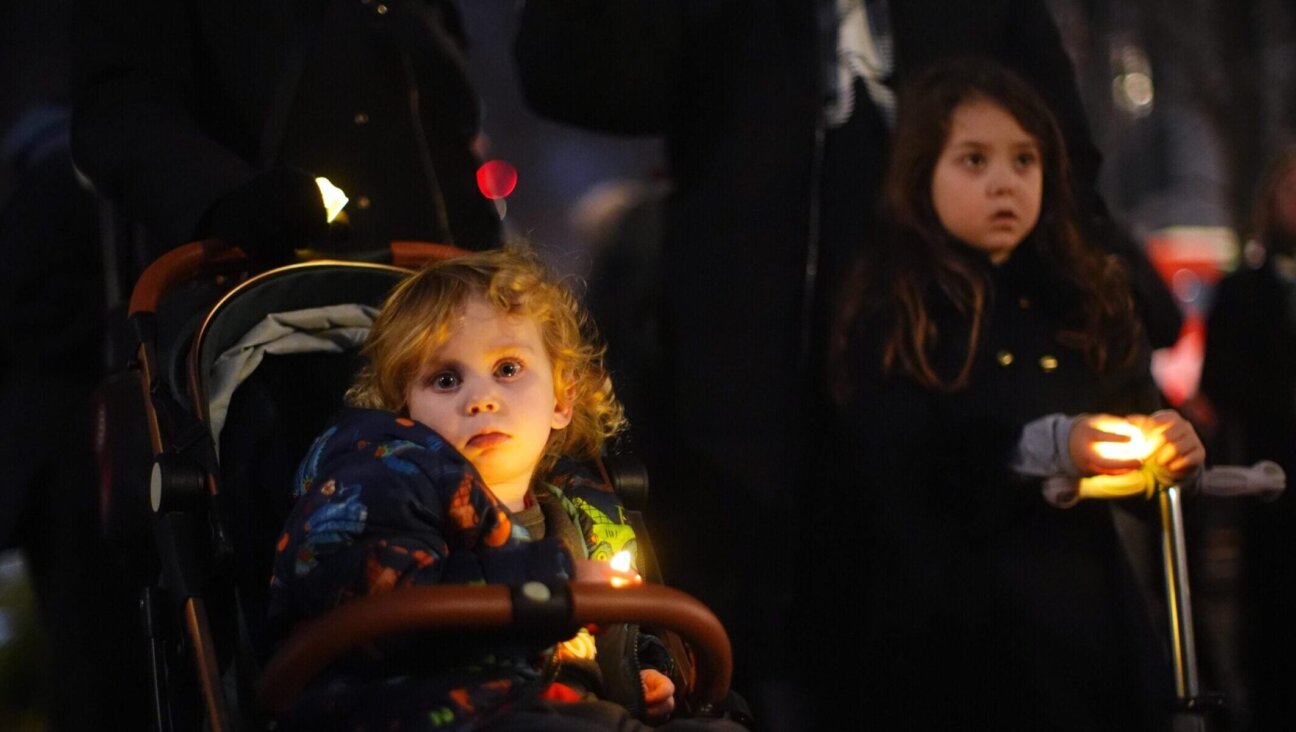A ‘Headache’ Of A Family Farm Gets Rebooted As A Jewish Community, With Pickles

An event at the rebooted Alliance Colony included a DIY pickling station. Image by Sarah Garfinkel
Girl meets boy, at a Brooklyn Starbucks, for a first date. Girl learns that boy is heir to a family farm — one of the first Jewish farms in North America. Girl, whose ancestors had a more typical immigration story, finds this appealingly different. Girl scoots in a little closer.
That meet-cute was nine years ago.
Malya Kurzweil, a law student, and William Levin, a writer, went on more dates and went on to marry. Yet it was a long while before the farm that provided some of that initial frisson became part of their lives.
The farm “was cool history but a present-day headache,” said Malya, now 35. The plan had always been to someday sell the land, called Alliance Colony, but they ended up buying it.

Malya and William Levin, who are together rebooting William’s family farm. Image by Ahron Moeller
Alliance Colony’s second act started in 2013, when William and Malya attended Sukkahfest, a Jewish harvest festival at Isabella Freedman Jewish Retreat Center in Falls Village, Connecticut.
They felt inspired by the contemporary Jewish farming movement, which many say began in 2003 with the founding of Adamah, a seasonal Jewish farming and community building fellowship program for adults ages 20-35. There are about fifteen Jewish farms in operation in the United States today.
Residential programs such as The Adamah Fellowship at Isabella Freedman, the Urban Adamah Fellowship in Berkeley and the Farm Educator Apprenticeship at Eden Village Camp in New York state engage young adults in community building. During the programs, participants learn skills such as food production, harvesting, composting and animal husbandry. The programs also incorporate Jewish history and spiritual practice.
During Sukkahfest, William commented that it was a shame that they were planning to sell his family’s farm. Malya’s father, the Jewish writer and teacher Arthur Kurzweil, asked, “Do you have to sell it?”
LOCATION, LOCATION, LOCATION
The answer had always been “yes.” Both worked in New York, Malya as a lawyer at an elder abuse shelter and William, now 47, as a writer and animator.
“We were living with a lot of assumptions,” said Malya. Slowly, those assumptions began to fade.
Forty minutes from Philadelphia and just a few hours’ drive from New York City, William’s family’s land in South Jersey had the potential to attract city dwellers and locals alike. The home rests on 50 acres of farmland. Across the street is a historic synagogue built in 1889 by the original immigrants. The synagogue remains in pristine condition. Nearby is a cemetery where many of the original settlers are buried.

The family farm known as Alliance Colony has its own synagogue. Image by Sarah Garfinkel
In October 2016, after successfully buying out the land from William’s family, William and Malya were ready to begin their project. They named it Alliance Colony Reboot.
They aimed to turn it into an attractive place for Jews to farm and practice spirituality. They also wanted to reveal a very different story of Jewish immigration — one in which the Russian Jews fleeing pogroms go not to the Lower East Side, but to a farm in South Jersey.
The story starts with the assassination of Czar Alexander II in 1881, which triggered upheaval and anti-Jewish persecution and a big wave of immigration.
The Jewish banker Jacob Schiff and the Baron de Hirsch Fund decided to try to help, and connected with William’s paternal great-great-grandfather, Moses Bayuk, who was a lawyer in Russia. In 1882, the foundation helped him bring a group of 43 Russian Jewish families to New York. From there, they were sent to South Jersey to learn to grow vegetables.
The adults had been intellectuals — doctors, lawyers, and businesspeople — when they left Russia. Owning land in Russia had not been possible for them. While the immigrants knew the Jewish laws of farming when they arrived, the trade itself was as foreign as the United States.
“They farmed because it was an opportunity that was available to them that allowed them to leave Russia,” said William. “And philosophically, they believed there was a dignity and holiness to working the land.”
COOL HISTORY
A few years after the 43 families arrived, Brooklyn factory owner Abraham Brotman agreed to bring his factory and the 60 families who worked there to Alliance, New Jersey. They built a new women’s coat factory, the only place with electricity in the community.
“This factory held the people over during the lean farming times,” said Richard Brotman, a descendant of Abraham Brotman.
Jews from nearby cities gradually began to hear of a community that embraced Jewish teachings and did not require work on the Sabbath. Soon after, they joined the colonists in South Jersey to farm and work in the factory.
After the Holocaust, a large wave of survivors joined Alliance Colony. This included William’s maternal family, who arrived in 1951. Unlike the original vegetable crop farmers, these families received grants to start chicken farms.
As the years passed, these Jewish farmers began to assimilate into American culture and migrate away from Alliance Colony.
While many — including William’s father — have tried to develop the land into something other than a farm, it’s been a challenge.
The location is “somewhat undesirable,” said William. Also, the township wants to preserve its farmland and open space.
Now, William and Malya plan to make the farmhouse a place for Jews to gather. Their first public event took place during Sukkot of 2017. Since then, guests have participated in farming projects to help the community grow as they wait for the land to be suitable for organic farming.
“It takes 36 months to transition from conventional farming with pesticides to organic farming,” said William. Organic farming is “more in line with Jewish teachings and how the land was managed in the 1880s.”
FERMENTATION STATION
Over New Year’s weekend of 2018, guests built a compost bin. With the compost bin project came a new tradition: Each Shabbaton, or weekend event, involves a farming or building component after Shabbat ends, and a visit to the historical sites surrounding the farmhouse.
Just a few weeks later, on Presidents’ Day weekend, Malya and William hosted a Shabbaton that completely filled the house. “We ran out of beds that weekend,” said Malya. “It was awesome.”
The project that weekend was building cold-frame garden beds, which William described as a microcosm of what the fields will represent. The materials included recycled windows, reclaimed pallets from a pallet yard, and fresh lumber.
Guests alternated between building and relaxing. Inside, the home was a cozy haven from the frigid air. A Havdalah ceremony marked the end of Shabbat and the beginning of the work week. Strangers shared stories over potluck meals of bagels, lox, kugel, and babka.
For now, most William and Malya’s project is self-funded, but they have begun to receive some small grants. Additionally, Hazon, the Jewish nonprofit focused on sustainability, reached out to the couple about hosting Jewish Outdoor, Food, Farming & Environmental Education Fellows.
The fellows would deepen their knowledge about farming, and also help Malya and William develop the farm as a business, Malya said.
William and Malya recently acquired Moses Bayuk’s original house, which sits next door to their farmhouse.
“We hope to immediately use the garage behind the house to store farm equipment, seeds, and crops,” said Malya. “In the future, we hope to restore the historic house and incorporate it into our project.”
A year after the first Sukkot Shabbaton at the farm, William and Malya hosted their biggest event yet: their 2nd Annual Sukkot Harvest Festival. Eden Village Camp and Philadelphia’s Jewish Farm School co-hosted, attracting a large and enthusiastic crowd.
On the grassy field outside of the historic synagogue, cleverly titled signs advertised stations for various farm-related activities. One sign read, “Salve-Ation: Holy Healing DIY Chapstick.” A pickling station advertised, “Fermentation Station: Just Like Your Bubbe Makes.” At other stations, children made apple cider, pesto, medicinal teas, banana ice cream and bread, while adults studied Talmud in the synagogue.
“The farm is a cool place for open-minded individuals to come and partake in something that is bigger than themselves,” said Rafi Koegel, who led the cold-frame project.
Sarah Garfinkel is a writer and educator living in Brooklyn. You can find more of her writing here.

















